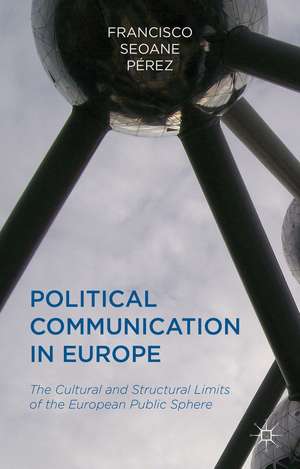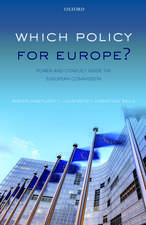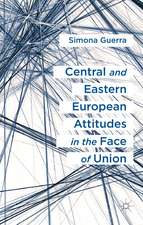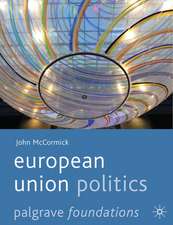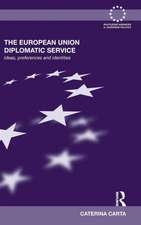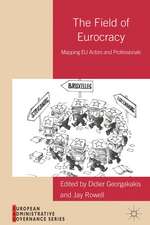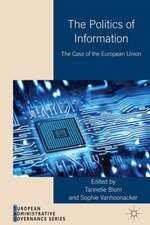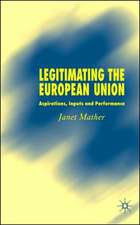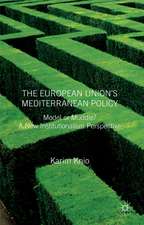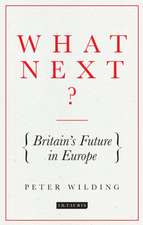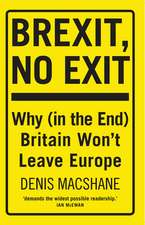Political Communication in Europe: The Cultural and Structural Limits of the European Public Sphere
Autor Francisco Pérezen Limba Engleză Hardback – 31 oct 2013
| Toate formatele și edițiile | Preț | Express |
|---|---|---|
| Paperback (1) | 386.81 lei 6-8 săpt. | |
| Palgrave Macmillan UK – 2013 | 386.81 lei 6-8 săpt. | |
| Hardback (1) | 392.60 lei 6-8 săpt. | |
| Palgrave Macmillan UK – 31 oct 2013 | 392.60 lei 6-8 săpt. |
Preț: 392.60 lei
Nou
Puncte Express: 589
Preț estimativ în valută:
75.14€ • 77.44$ • 63.44£
75.14€ • 77.44$ • 63.44£
Carte tipărită la comandă
Livrare economică 01-15 martie
Preluare comenzi: 021 569.72.76
Specificații
ISBN-13: 9781137305121
ISBN-10: 1137305126
Pagini: 291
Ilustrații: X, 291 p.
Dimensiuni: 140 x 216 x 20 mm
Greutate: 0.52 kg
Ediția:2013
Editura: Palgrave Macmillan UK
Colecția Palgrave Macmillan
Locul publicării:London, United Kingdom
ISBN-10: 1137305126
Pagini: 291
Ilustrații: X, 291 p.
Dimensiuni: 140 x 216 x 20 mm
Greutate: 0.52 kg
Ediția:2013
Editura: Palgrave Macmillan UK
Colecția Palgrave Macmillan
Locul publicării:London, United Kingdom
Cuprins
List of Illustrations Acknowledgements Introduction 1. The True Deficits of the European Public Sphere: Domesticisation and Politicisation 2. The Anti-popular Bias of Integration by Stealth 3. Governing the EU: Consensus Diplomacy and Associative Corporatism 4. The 'no demos' Conundrum 5. Explaining the Domesticisation Deficit 6. Explaining the Politicisation Deficit 7. Conclusions Methodological Appendix Notes Bibliography Index TBD
Recenzii
'Communicating Europe and awakening and sustaining public interest in the European Union remains problematic for many different reasons. Teasing out why this should be the case nearly sixty years after the signing of the Rome Treaty marking the creation of the perhaps misleadingly named European Economic Community is tackled in this book from a novel perspective. Francisco Pérez confronts the questions key to understanding not so much why people seemingly do not 'love' the EU but why they continue to find engaging with it unappealing. With Euroscepticism rising on the eve of the 2014 elections to the European Parliament, the book could not be more timely.'
Juliet Lodge, Institute of Communication Studies and Jean Monnet European Centre of Excellence, University of Leeds, UK
'Seoane Pérez offers a sharp and astute analysis of the EU's chronic malaise coming to the conclusion that it suffers from not one, but a double democratic deficit: a domesticisation deficit, the failure to connect to the EU as is always remote, and a politicisation deficit as EU politics is not 'normal' politics, amenable to a left versus right distinction. Across the axes of community, integration and governance, the book manages through original research and analysis to open new horizons in a tired and self-fulfilling debate about the EU, democracy and citizenship.'
Katharine Sarikakis, Department of Communication, University of Vienna, Austria
'With his careful study of the system of political communication in Europe, Seoane Pérez demonstrates how the political organizations of the EU have been built to stifle any pervasive sense of a European polity. From euroskeptic Yorkshire to pro-EU Galicia, his interviews, observations and news content analysis reveals why the framing of regional issues by political actors has actually prevented citizens from feeling that EU issues are relevant or contentious enough to engage them.'
Philip N. Howard, Department of Communication, University of Washington, USA
Juliet Lodge, Institute of Communication Studies and Jean Monnet European Centre of Excellence, University of Leeds, UK
'Seoane Pérez offers a sharp and astute analysis of the EU's chronic malaise coming to the conclusion that it suffers from not one, but a double democratic deficit: a domesticisation deficit, the failure to connect to the EU as is always remote, and a politicisation deficit as EU politics is not 'normal' politics, amenable to a left versus right distinction. Across the axes of community, integration and governance, the book manages through original research and analysis to open new horizons in a tired and self-fulfilling debate about the EU, democracy and citizenship.'
Katharine Sarikakis, Department of Communication, University of Vienna, Austria
'With his careful study of the system of political communication in Europe, Seoane Pérez demonstrates how the political organizations of the EU have been built to stifle any pervasive sense of a European polity. From euroskeptic Yorkshire to pro-EU Galicia, his interviews, observations and news content analysis reveals why the framing of regional issues by political actors has actually prevented citizens from feeling that EU issues are relevant or contentious enough to engage them.'
Philip N. Howard, Department of Communication, University of Washington, USA
Notă biografică
Francisco Seoane Pérez holds a PhD in Communications Studies from the University of Leeds, an MA in Communication from the University of Illinois at Chicago (USA, 2006, with a grant from the Fundación Pedro Barrié de la Maza) and a BA in Journalism from the University of Santiago de Compostela (2001). His scholarly interests include the role of journalism in liberal democracies, the idea of a European public sphere, and the impact of the Internet on political participation. He is an associate editor for the International Journal of Media & Cultural Politics.
Descriere
Descriere de la o altă ediție sau format:
The disconnection between the institutions of the EU and the people of Europe has often been attributed to the existence of a communication gap resulting from the failure of national medias and politicians to convey the importance of the EU. This book challenges that idea instead showing that the fault lies with the idea and institutions of the EU.
The disconnection between the institutions of the EU and the people of Europe has often been attributed to the existence of a communication gap resulting from the failure of national medias and politicians to convey the importance of the EU. This book challenges that idea instead showing that the fault lies with the idea and institutions of the EU.
